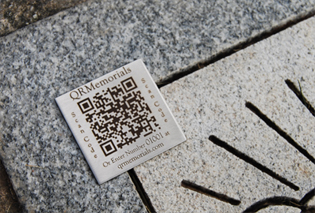 Traditionally, the deceased have been buried in a grave which is marked by a lifeless granite tombstone. The tombstone conveys just basic information – the name of the person and his or her years of life. Sometimes it also includes a short phrase about the person, such as “beloved parent” or “lived life to the fullest”.
Traditionally, the deceased have been buried in a grave which is marked by a lifeless granite tombstone. The tombstone conveys just basic information – the name of the person and his or her years of life. Sometimes it also includes a short phrase about the person, such as “beloved parent” or “lived life to the fullest”.
If you’ve ever walked around a cemetery, you’ve probably looked at many of these stones and may have wished that you could know more about the people buried beneath them.
Now there is technology that will enable you to learn more. A QR barcode sticker can be affixed to an individual’s tombstone. Then the family of the deceased can link the code to an electronic obituary of the person, a biography, a video or images and much more. Finally, if you have a smartphone with internet access, you can walk by this stone, scan the barcode and view the online tribute to the person.
Some companies, like Digital Legacys, a Pennsylvania company, sell the QR barcode sticker and the online tribute link for $99.99 per year or $149.99 for a lifetime subscription to the service.
Living Headstones®, Seattle, Washington, is a monument company. Thru them, you can buy a headstone that has an embedded QR barcode and a code link to their memorial site for $75. However, if you already have a tombstone, you can purchase a QR barcode and a link to their memorial site for $150.
These QR barcodes can also be attached to memorial benches, plaques or even trees in a memorial garden.
With a QR barcode, a deceased’s legacy can live on. Isn’t that better than just seeing their name and date of birth and death? What do you think?
